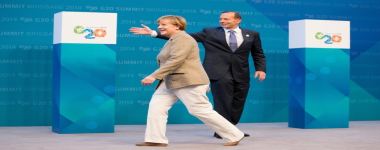by Harald Sander, The Conversation
Shortly after the G20 summit in Brisbane, German Chancellor Angela Merkel and Australian Prime Minister Tony Abbott announced initiatives to increase trade and investment relations between Germany and Australia. Both parties agreed to set up a joint working group to identify future initiatives. What can we reasonably expect from it?

Â
First some facts:
- Bilateral trade in goods between Australia and Germany is grossly unbalanced, with Germany’s exports in 2013 standing at A$11.4 billion while imports from Australia were just A$1.9 billion.
- Germany’s exports are concentrated on machinery (35%) and transportation equipment (30%) while Australia’s exports are heavily biased toward minerals.
- Germany’s exports of services count for only 13% of total German exports to Australia, while Australia is relatively strong in exporting services to Germany, though at a low level of A$1.1 billion. By contrast, the UK service exports dominate their total export to Australia.
- With respect to Foreign Direct Investment (FDI), Australia has investments worth US$56.6 billion in Germany, constituting 3.5% of its total outward stock. Conversely, Germany’s investments amount to US$24.2 billion in Australia, making a much smaller share of its total outward investments (1.4%).
- The EU is a more important source for goods and services for Australia (17.4%) than the USA (11.9 %).
What is at stake for Germany and Europe? Three major points are worth highlighting:
Strengthening Germany’s strengths
A first and simple argument recognises that Germany is a very successful exporter of manufactures, which follows an export-led growth model. As such, it is self-evident that Germany has an interest in boosting its exports.
But the current bilateral trade and investment pattern show that Germany’s success depends largely on arm’s length trade in a few industries, reflecting these particular strengths of the German economy. Additionally and related, FDI are underdeveloped, partly because FDI in manufacturing requires high up-front investment costs, which may not be fast and easily recovered in the relatively small Australian market.

